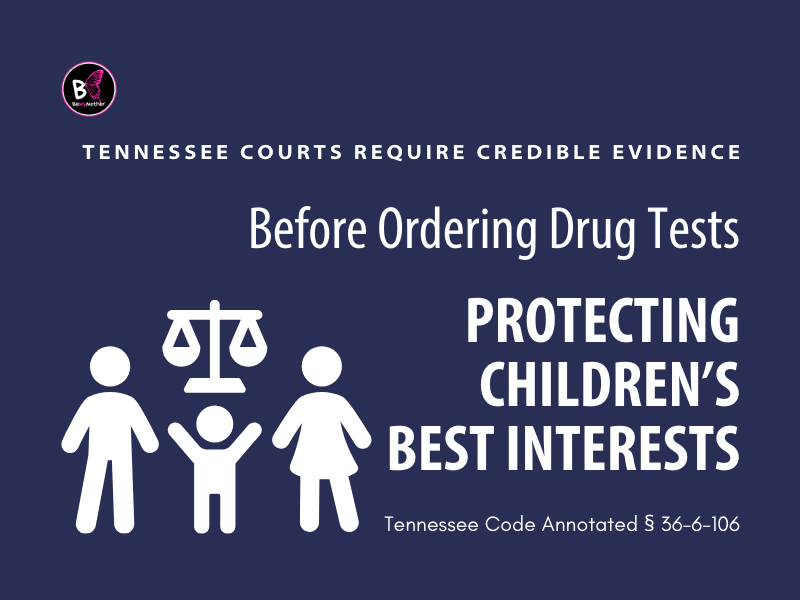When navigating child custody disputes or concerns about a child’s well-being, emotions and legalities often collide. One question that frequently arises is: Can a parent demand drug testing on a child in Tennessee? Understanding the laws, policies, and implications behind drug testing in the state is crucial for parents and guardians seeking to protect their children’s best interests.
This article provides a comprehensive overview of Tennessee’s drug testing policies and procedures and how they affect custody cases. Whether you’re a concerned parent or a caregiver caught in a complex legal situation, this guide is designed to help you make informed decisions.
1. Can a Parent Demand Drug Testing on a Child in Tennessee?
Yes, a parent can request drug testing for a child in Tennessee, but it isn’t as straightforward as simply demanding it. Courts prioritize the child’s best interests and require reasonable evidence to justify the need for such testing.
Key Considerations:
- Court Approval: A parent must file a motion and provide valid reasons for the request. Suspicion alone may not be sufficient.
- Judicial Oversight: Judges assess whether the test is necessary to ensure the child’s safety and well-being.
2. Tennessee Drug Testing Policies for Child Custody Cases

Tennessee courts follow strict guidelines to ensure fairness and accuracy in drug-related custody disputes. Drug testing policies are primarily applied in two scenarios:
- When a Child’s Welfare Is at Risk: If there is evidence suggesting exposure to substance abuse.
- When a Parent’s Fitness Is Questioned: Drug testing may be required for custody determination.
Common Policies Include:
- Testing is ordered through court-approved facilities.
- Confidential handling of results to protect the child’s privacy.
💡 Related Article: Interested in working with children and ensuring their well-being? Find out everything you need to know in What Is Required to Be a NYS Child Care Worker? 10 Key Steps to Unlock Your Dream Career. Start your journey toward a meaningful career.
3. Types of Drug Tests Used in Tennessee Child Custody Cases.
Tennessee courts rely on several types of drug tests to ensure accurate results. Each has its advantages and limitations.
| Test Type | Detection Window | Common Usage |
| Urine Test | 2–7 days | Most frequently used due to cost and reliability. |
| Hair Follicle Test | Up to 90 days or more | Detects long-term drug use but is more expensive. |
| Saliva Test | 1–3 days | Non-invasive but less reliable for extended detection. |
| Blood Test | Immediate past 24 hours | Often used for suspected recent drug use. |
Judges may choose a specific test based on the circumstances of the case and the substances in question.
How long are different drugs detectable in your system – urine testing, hair testing, etc.
4. How Drug Use Impacts Child Custody Decisions in Tennessee.
Drug use, whether by a parent or child, can significantly impact custody arrangements in Tennessee. Courts are guided by the Tennessee Code Annotated § 36-6-106, which prioritize the child’s safety and emotional well-being.
Potential Outcomes:
- Loss of Custody: If a parent’s drug use poses a direct risk to the child.
- Supervised Visitation: Courts may limit contact to supervised settings until the parent demonstrates sobriety.
- Rehabilitation Requirements: Parents may need to complete treatment programs as a condition for regaining custody.
Drug use is often viewed as a sign of instability, making it critical for parents to demonstrate a commitment to maintaining a safe, healthy and nurturing home environment for their children.
5. Steps to File a Motion for Drug Testing in Tennessee
If you believe drug testing is necessary, here’s how to file a motion:
- Gather Evidence: Document behaviour or incidents that justify your request.
- File a Motion: Submit the motion for drug testing through your local family court.
- Attend a Hearing: Be prepared to present your case before a judge.
- Comply with Court Orders: Follow the court’s instructions, including submitting additional documentation if required.
Pro Tip:
Navigating the legal process without a lawyer can feel overwhelming, but you’re not alone. Review Tennessee’s specific court procedures, including filing deadlines, required documentation, and motion formats. Many courts offer online resources or self-help guides tailored for individuals representing themselves.
Additionally, consider contacting local legal aid organizations or family law clinics. These resources often provide free or low-cost consultations to help you understand your rights, complete paperwork, and prepare for court hearings. A little guidance can make a big difference in confidently presenting your case.
💡 Related Article: Curious about how foster care can support families. Explore the financial aspects and responsibilities in How Much Do Foster Parents Get Paid Per Child? 8 Essential Facts You Can’t Miss. Gain valuable insights about foster parenting.
6. Protecting the Best Interests of the Child in Drug-Related Custody Cases

In Tennessee, courts operate under the principle that decisions must always reflect the child’s best interests. This principle guides drug testing orders, custody arrangements, and visitation rulings.
Key Strategies for Parents:
- Document any concerns about drug use or risky behaviours.
- Work collaboratively with legal professionals and child protection agencies.
- Focus on creating a stable and nurturing environment for your child.
💡 Related Article: Wondering how to ensure your child’s caregivers are truly trustworthy? Don’t miss our guide: What Backgrounds Do Child Care Providers Use? 9 Eye-Opening Facts Parents Can’t Ignore for tips on safeguarding your child’s well-being.
7. Can a Parent Demand Drug Testing on an Ex-Spouse or Co-Parent?
In Tennessee, a parent can request drug testing for an ex-spouse or co-parent if they believe substance abuse is endangering the child. However, the process involves filing a motion and presenting credible evidence to the court.
What Judges Look For:
- Documented incidents of suspected drug use.
- Testimony from witnesses or professionals (e.g., teachers, doctors).
- Evidence of how the behaviour impacts the child’s safety or well-being.
💡 Related Article: Wondering how some states help parents caring for disabled children? Learn about supportive programs in What States Pay Parents to Care for Disabled Children? 8 Shocking Unmissable Facts Discover opportunities for parents making a difference.
FAQ: Common Questions About Drug Testing in Tennessee Custody Cases
1. How far back can a drug test detect substances in Tennessee?
- It depends on the type of test. Hair follicle tests can detect use up to 90 days or longer, while urine tests are more limited (2–7 days).
2. Can a parent refuse to take a court-ordered drug test?
- Refusing a court-ordered test can result in legal consequences, such as losing custody or visitation rights.
3. What happens if a parent fails a drug test during a custody dispute?
- Failing a test may lead to supervised visitation, mandatory treatment, or, in severe cases, loss of custody.
4. Can the other party “beat” a drug test?
- While attempts to manipulate drug tests exist, court-approved facilities use strict protocols to ensure accuracy and reliability.
5. Do courts inform you in advance about drug testing?
- In most cases, courts may provide notice for testing. However, surprise testing is possible if the situation warrants it.
Conclusion
Navigating custody disputes can be stressful, especially when drug testing is involved. Understanding the laws and processes surrounding “Can a parent demand drug testing on a child in Tennessee” can empower parents and caregivers to take the proper steps to protect their children. The process requires careful preparation and focus on the child’s best interests, from filing motions to complying with court-ordered testing. Whether seeking clarity or advocating for your family’s safety, this guide provides the foundation to make informed decisions.



